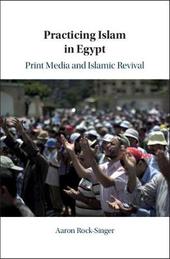
|
Practicing Islam in Egypt: Print Media and Islamic Revival
Hardback
Main Details
Description
Following the ideological disappointment of the 1967 Arab-Israeli War, an Islamic revival arose in Egypt. Yet, far from a mechanical reaction to the decline of secular nationalism, this religious shift was the product of impassioned competition among Muslim Brothers, Salafis and state institutions and their varied efforts to mobilize Egyptians to their respective projects. By pulling together the linked stories of these diverse claimants to religious authority and tracing the social and intellectual history of everyday practices of piety, Aaron Rock-Singer shows how Islamic activists and institutions across the political spectrum reshaped daily practices in an effort to persuade followers to adopt novel models of religiosity. In so doing, he reveals how Egypt's Islamic revival emerged, who it involved, and why it continues to shape Egypt today.
Author Biography
Aaron Rock-Singer is Visiting Assistant Professor in the Department of Near Eastern Studies at Cornell University, New York. He holds a Ph.D. in Near Eastern Studies from Princeton University, New Jersey.
Reviews'Aaron Rock-Singer tells the story of the Islamic revival in Egypt during and after the 1970s in a way that is sufficiently subtle and new that it will lead even specialists to understand Egypt differently. The state appears, for instance, not in the guise of an authoritarian regime or repressive security services but as a set of religious actors and arenas that are very much entwined with the revival. A wide variety of other actors are not merely presented but their ideas and interactions probed in fresh and fruitful ways.' Nathan Brown, George Washington University, Washington DC 'Practicing Islam in Egypt offers a riveting account of how state religious institutions, the Muslim Brotherhood, and Salafi movements competed for influence over everyday practice and public space in Egypt from the 1970s to the present. Rock-Singer's close reading of widely distributed texts and periodicals in the immediate pre-Internet era offers a rock-solid analysis that challenges conventional assumptions about the currents and counter-currents of local religious mobilization and state control, and their continuing influence on daily life and public space.' Dale F. Eickelman, Dartmouth College, New Hampshire 'Upending scholarly claims of Islam's discursive continuity against secular modernity, Rock-Singer keenly details postcolonial Egyptian Islamic movements' profound contemporaneity - their affinities with the postcolonial state and non-Muslim revivals, their immersion in mass media, and much more. In reframing Islam and politics, Practicing Islam in Egypt illuminates the late modern 'return of religion' more broadly.' Emilio Ibrahim Spadola, Tufts University, Massachusetts
|